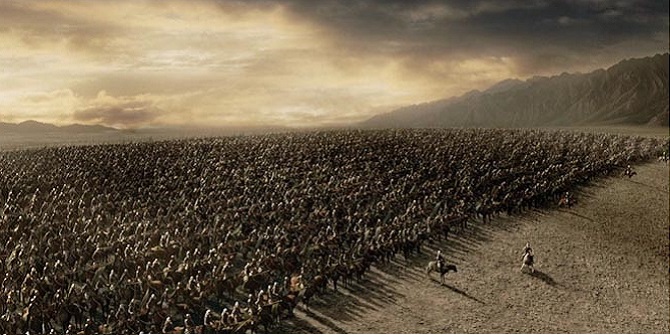75 years ago the BBC’s Richard Dimbleby was the first broadcaster to report from the liberation of Belsen concentration camp by the British Second Army on April 15th, 1945. His 10 minute radio report is an extraordinary historic act of journalism as witnessing. It was actually broadcast a few days after the event, apparently because his bosses back in London did not initially believe that the horrors he described were real.
It feels somewhat fatuous to analyse this vital historical record for its journalistic merit but it’s worth paying respect to the craft, intelligence and compassion that Dimbleby deployed at what must have been a shattering personal moment.

The writing is terse with short sentences mixed with longer paragraphs. It is grounded self-consciously on carefully verified facts. He knew he was reporting the unbelievable and had to strain to convince the listener. The horrific details and the grotesque scale of the Holocaust are relatively familiar now, but back in 1945 the public knew little of what had happened.
It is also remarkable that alongside this exemplary objectivity he manages to convey the emotion of the scene and even his own response (‘I wish with all my heart…’). He deliberately makes an overt moral, political appeal for attention to this war crime.
Please listen to the report by clicking on the image below. [If you are outside the UK and can’t access that official BBC archive link, there is also a version on YouTube] There is a transcription below that shows that while this was above all a work of broadcast journalism, it is also one of the greatest pieces of writing I have read. This was not a feature created at leisure to reflect upon an event. This was a piece of reportage from a correspondent exhausted by five years of combat journalism suddenly confronted with a scene beyond imagination. That he found any words to describe it is impressive. That he did so in a way that brings you to that place, that shows you its significance as well as its appalling reality is quite astounding. In just over ten minutes he revealed the banal horror of the Holocaust. 75 years on it remains an exemplar of the value of journalism and one of the finest demonstrations of how the first draft is critical to our proper understanding of human history. It is completely of its time, yet by addressing in detail the facts of these dark deeds it speaks to us still about our capacity for cruelty – and compassion. The world will always need expert witnesses, the core ethical task for journalism.
Transcript:
I have just returned from the Belsen concentration camp where I drove slowly about the place in a Jeep with the chief doctor of the Second Army.
I had waited a day before going to the camp so that I could be absolutely sure of the facts now available.
I find it hard to describe adequately the horrible things that I’ve seen and heard but here unadorned are the facts.
There are 40,000 men, women and children in the camp, German and half a dozen other nationalities and thousands of them Jews.
Of this total of forty thousand, four thousand two hundred and fifty are acutely ill or dying of virulent disease.
Typhus, typhoid, diphtheria, dysentery, pneumonia and childbirth fever are rife
25,600, three quarters of them women, are either ill from lack of food or are actually dying of starvation.
In the last few months alone thirty thousand prisoners have been killed off or allowed to die.
Those are the simple horrible facts of Belsen.
But horrible as they are they can convey little or nothing in themselves.
I wish with all my heart that everyone fighting in this war – and above all those whose duty it is to direct the war from Britain and America – could have come with me through the barbed-wire fence that leads to the inner compound of the camp.
Outside it had been the lucky prisoners – the men and women who had only just arrived at Belsen before we captured it.
But beyond the barrier was a whirling cloud of dust, the dust of thousands of slowly moving people, laden in itself with the deadly typhus germ.
And with the dust was a smell, sickly and thick, the smell of death and decay of corruption and filth.
I passed through the barrier and found myself in the world of a nightmare.
Dead bodies, some of them in decay lay strewn about the road.
And along the rutted tracks on each side of the road were brown wooden huts. There were faces at the windows. The bony emaciated faces of starving women too weak to come outside – propping themselves against the glass to see the daylight before they died.
And they were dying, every hour and every minute.
I saw a man wandering dazedly along the road then stagger and fall. Someone else looked down at him, took him by the heels and dragged him to the side of the road to join the other bodies lying unburied there. No one else took the slightest notice, they didn’t even trouble to turn their heads
Behind the huts two youths and two girls who’d found a morsel of food were sitting together on the grass in picnic fashion sharing it. They were not six feet from a pile of decomposing bodies
Inside the huts it was even worse.
I’ve seen many terrible sights in the last five years but nothing, nothing approaching the dreadful interior of this hut at Belsen
The dead and the dying lay close together
I picked my way over corpse after corpse in the gloom until I heard one voice that rose above the gentle undulating moaning.
I found a girl, she was a living skeleton impossible to gauge her age for she had practically no hair left on her head and her face was only a yellow parchment sheet with two holes in it for eyes. She was stretching out her stick of an arm and gasping something. It was ‘English, English. Medicine, medicine’ And she was trying to cry but had not enough strength.
And beyond her down the passage and in the hut there were the convulsive movements of dying people too weak to raise themselves from the floor. They were crawling with lice and smeared with filth. They had no food for days. For the Germans sent it down into the camp en bloc and only those strong enough to come out of the huts could get it. The rest of them lay there in the shadows growing weaker and weaker
There was no one to take the bodies away when they died. And I had to look hard to see who was alive and who was dead
It was the same outside in the compounds. Men and women lying about the ground and the rest of the procession of ghosts wandering aimlessly about them.
In the shade of some trees lay a great collection of bodies. I walked round them trying to count. There were perhaps a hundred and fifty flung down on each other – all naked, all so thin that their yellow skins glistened like stretched rubber on their bones.
Some of the poor starved creatures whose bodies were there looked so utterly unreal and inhuman that I could have imagined that they had never lived at all. They were like polished skeletons, the skeletons that medical students like to play practical jokes with.
At one end of the pile a cluster of men and women were gathered around a fire. They were using rags and old shoes taken from the bodies to keep it alight and they were heating soup on it.
And close by was the enclosure where 500 children between the ages of five and twelve had been kept. They were not so hungry as the rest for the women had sacrificed themselves to keep them alive.
Babies were born at Belsen, some of them shrunken wizened little things that could not live because their mothers could not feed them.
One woman distraught to the point of madness flung herself at a British soldier who was on guard in the camp on the night that it was reached by the 11th Armoured Division. She begged him to give her some milk for the tiny baby she held in her arms. She laid the mite on the ground, threw herself at the sentry’s feet and kissed his boots. And when in his distress he asked her to get up, she put the baby in his arms and ran off crying that she would find milk for it because there was no milk in her breast. And when the soldier opened the bundle of rags to look at the child he found it had been dead for days.
I have never seen British soldiers so moved to cold fury as the men who opened the Belsen camp this week and those of the police and the RAMC who are now on duty there, trying to save the prisoners who are not too far gone in starvation.
The SS guards who shot several of the prisoners after we’d arrived in the camp when they thought no one was looking are now gathering up all the bodies and carting them away for burial. German prisoners are being sent up for the same sort of work.
Kramer, the SS major who was Commandant of the camp and who had been second-in-command of one of the mass murder camps in Poland lies today in a British prison cage
As we went deeper into the camp and further from the main gate we saw more and more of the horrors of the place and I realised that what is so ghastly is not so much the individual acts of barbarism that take place in SS camps but the gradual breakdown of civilisation that happens when human beings are herded like animals behind barbed wire. Here in Belsen we were seeing people, many of them lawyers and doctors and chemists, musicians, authors, who’d long since ceased to care about the conventions and the customs of normal life.
There had been no privacy there of any kind. Women stood naked at the side of the track washing in cupfuls of water taken from British Army water trucks. Others squatted while they searched themselves for lice and examined each other’s hair. Sufferers from dysentery leaned against the huts straining helplessly.
And all around and about them was this awful drifting tide of exhausted people neither caring nor waiting – just a few held out their withered hands to us as we passed by and blessed the doctor whom they knew had become the camp commander in the place of the brutal Kramer.
We were on our way down to the crematorium where the Germans had burned alive thousands of men and women in a single fire. The furnace was in a hut about the size of a single garage – and the hut was surrounded by a small stockade.
A little Pole whose prison number was tattooed on the inside of his forearm, as it was on all the others, told me how they burned the people. They brought them into the stockade, walked them in and then an SS guard hit them on the back of the neck with a club and stunned them and then they were fed straight into the fire, three at a time, two men, one woman. The opening was not big enough for three men and that I verified by measuring it. They burned 10,000 people in this fire in reprisal for the murder of two SS guards.
And back in the hut by the main gate of the camp I questioned the sergeant who’d been in charge of one of the SS squads. He was a fair-haired gangling creature with tiny crooked ears rather like gerbils and big hands. His SS uniform was undone and dirty; he was writing out his confession while a young North Country anti-tank gunner of the 11th Armored Division kept watch on him with a tommy gun that never moved. I asked him how many people he had killed. He looked vacant for a moment and then he replied ‘oh I don’t remember’.
I have set down these facts of length because in common with all of us who’ve been to the camp I feel that you should be told without reserve exactly what has been happening there.
Every fact I’ve so far given you has been verified but there is one more awful than all the others that I’ve kept to the end.
Far away in a corner of Belsen camp there is a pit the size of a tennis court. It’s 15 feet deep and at one end it’s piled to the very top with naked bodies that have been tumbled in one on top of the other. Like this must have been the Plague pits in England 300 years ago, only nowadays we can help by digging them quicker with bulldozers, and already there’s a bulldozer at work in Belsen.
Our army doctors on examining some of these bodies found in their sides a long slit apparently made by someone with surgical knowledge. They made enquiries and they established beyond doubt that in the frenzy of their starvation some of the people of Belsen had taken the wasted bodies of their fellow prisoners and had removed from them the only remaining flesh, the liver and the kidneys to eat.
May I add to this story only the assurance that everything that an army can do to save these men and women and children is being done and that those officers and men who’ve seen these things have gone back to the Second Army moved to an anger such as I have never seen in them before.
Richard Dimbleby, BBC, broadcast April 19th 1945






